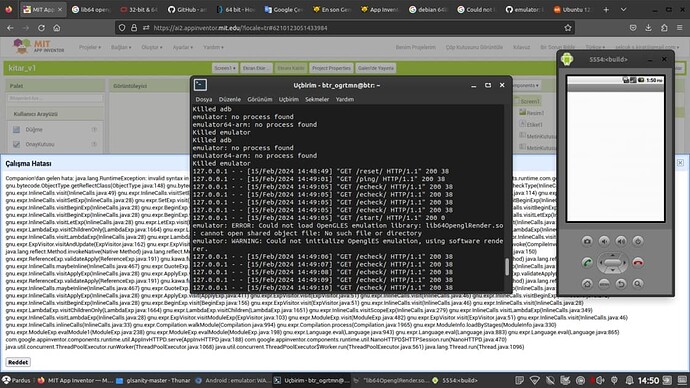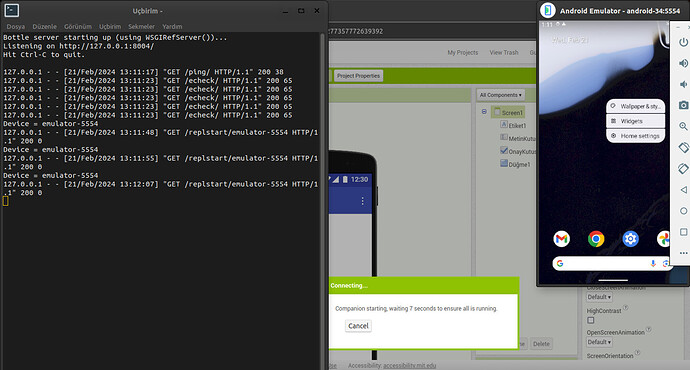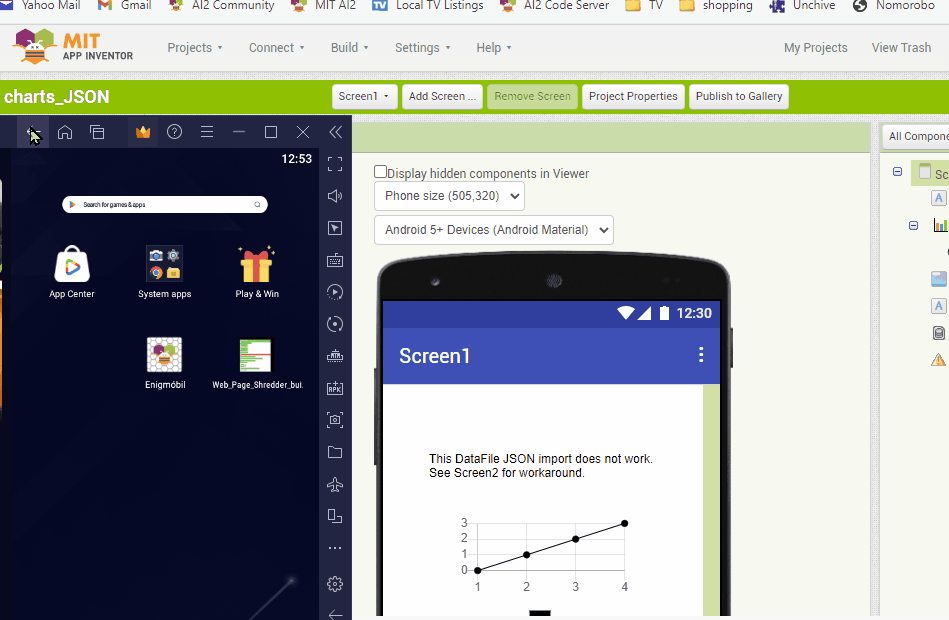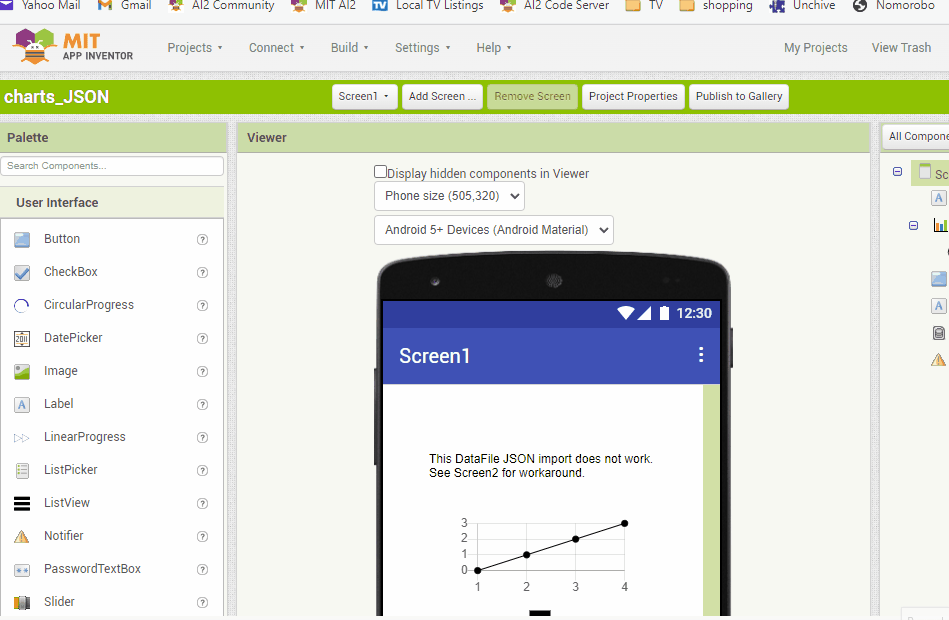Hi, I'm using GNU/Linux Pardus 23.1 Operating System (64bit). We want to develop a mobile application using an emulator.
I installed lib32z1 and appinventor2-setup_2.3_all.deb packages the instructions in the link. Opening emulator with /usr/google/appinventor/commands-for-Appinventor/aiStarter & code.
The following output appears in the console
127.0.0.1 - - [15/Feb/2024 14:45:03] "GET /ping/ HTTP/1.1" 200 38
127.0.0.1 - - [15/Feb/2024 14:45:07] "GET /echeck/ HTTP/1.1" 200 38
127.0.0.1 - - [15/Feb/2024 14:45:07] "GET /echeck/ HTTP/1.1" 200 38
127.0.0.1 - - [15/Feb/2024 14:45:07] "GET /echeck/ HTTP/1.1" 200 38
127.0.0.1 - - [15/Feb/2024 14:45:07] "GET /echeck/ HTTP/1.1" 200 38
127.0.0.1 - - [15/Feb/2024 14:45:07] "GET /start/ HTTP/1.1" 200 0
emulator: ERROR: Could not load OpenGLES emulation library: lib64OpenglRender.so: cannot open shared object file: No such file or directory
emulator: WARNING: Could not initialize OpenglES emulation, using software renderer.
After starting the emulator, I get the following error in the browser just as the application is about to open.
Summary
Error from Companion: java.lang.RuntimeException: invalid syntax in eval form: :9:1: caught exception in inliner for # - java.lang.RuntimeException: no such class: com.google.appinventor.components.runtime.com.google.appinventor.components.runtime.Image gnu.bytecode.ObjectType.getReflectClass(ObjectType.java:148) gnu.bytecode.ClassType.getModifiers(ClassType.java:103) gnu.bytecode.ClassType.isInterface(ClassType.java:471) gnu.expr.InlineCalls.checkType(InlineCalls.java:56) gnu.expr.InlineCalls.visit(InlineCalls.java:49) gnu.expr.InlineCalls.visitSetExpValue(InlineCalls.java:363) gnu.expr.InlineCalls.visitSetExpValue(InlineCalls.java:28) gnu.expr.ExpVisitor.visitSetExp(ExpVisitor.java:114) gnu.expr.InlineCalls.visitSetExp(InlineCalls.java:369) gnu.expr.InlineCalls.visitSetExp(InlineCalls.java:28) gnu.expr.SetExp.visit(SetExp.java:406) gnu.expr.ExpVisitor.visit(ExpVisitor.java:55) gnu.expr.InlineCalls.visit(InlineCalls.java:46) gnu.expr.InlineCalls.visitBeginExp(InlineCalls.java:272) gnu.expr.InlineCalls.visitBeginExp(InlineCalls.java:28) gnu.expr.BeginExp.visit(BeginExp.java:156) gnu.expr.ExpVisitor.visit(ExpVisitor.java:51) gnu.expr.InlineCalls.visit(InlineCalls.java:46) gnu.expr.InlineCalls.visitBeginExp(InlineCalls.java:272) gnu.expr.InlineCalls.visitBeginExp(InlineCalls.java:28) gnu.expr.BeginExp.visit(BeginExp.java:156) gnu.expr.ExpVisitor.visit(ExpVisitor.java:51) gnu.expr.InlineCalls.visit(InlineCalls.java:46) gnu.expr.InlineCalls.visitLetExp(InlineCalls.java:317) gnu.expr.InlineCalls.visitLetExp(InlineCalls.java:28) gnu.expr.LetExp.visit(LetExp.java:207) gnu.expr.ExpVisitor.visit(ExpVisitor.java:51) gnu.expr.InlineCalls.visit(InlineCalls.java:46) gnu.expr.InlineCalls.visit(InlineCalls.java:28) gnu.expr.LambdaExp.visitChildrenOnly(LambdaExp.java:1664) gnu.expr.LambdaExp.visitChildren(LambdaExp.java:1651) gnu.expr.InlineCalls.visitScopeExp(InlineCalls.java:279) gnu.expr.InlineCalls.visitLambdaExp(InlineCalls.java:349) gnu.expr.InlineCalls.visitLambdaExp(InlineCalls.java:28) gnu.expr.LambdaExp.visit(LambdaExp.java:1640) gnu.expr.ExpVisitor.visit(ExpVisitor.java:55) gnu.expr.InlineCalls.visit(InlineCalls.java:46) gnu.expr.InlineCalls.visit(InlineCalls.java:28) gnu.expr.ExpVisitor.visitAndUpdate(ExpVisitor.java:162) gnu.expr.ExpVisitor.visitExps(ExpVisitor.java:176) gnu.expr.ApplyExp.visitArgs(ApplyExp.java:416) gnu.kawa.reflect.CompileInvoke.validateApplyInvoke(CompileInvoke.java:23) java.lang.reflect.Method.invokeNative(Native Method) java.lang.reflect.Method.invoke(Method.java:521) gnu.expr.InlineCalls.maybeInline(InlineCalls.java:467) gnu.expr.QuoteExp.validateApply(QuoteExp.java:150) gnu.expr.ReferenceExp.validateApply(ReferenceExp.java:191) gnu.kawa.functions.CompilationHelpers.validateApplyToArgs(CompilationHelpers.java:66) java.lang.reflect.Method.invokeNative(Native Method) java.lang.reflect.Method.invoke(Method.java:521) gnu.expr.InlineCalls.maybeInline(InlineCalls.java:467) gnu.expr.QuoteExp.validateApply(QuoteExp.java:150) gnu.expr.ReferenceExp.validateApply(ReferenceExp.java:191) gnu.expr.InlineCalls.visitApplyExp(InlineCalls.java:119) gnu.expr.InlineCalls.visitApplyExp(InlineCalls.java:28) gnu.expr.ApplyExp.visit(ApplyExp.java:411) gnu.expr.ExpVisitor.visit(ExpVisitor.java:55) gnu.expr.InlineCalls.visit(InlineCalls.java:46) gnu.expr.QuoteExp.validateApply(QuoteExp.java:162) gnu.expr.ReferenceExp.validateApply(ReferenceExp.java:191) gnu.kawa.functions.CompilationHelpers.validateApplyToArgs(CompilationHelpers.java:66) java.lang.reflect.Method.invokeNative(Native Method) java.lang.reflect.Method.invoke(Method.java:521) gnu.expr.InlineCalls.maybeInline(InlineCalls.java:467) gnu.expr.QuoteExp.validateApply(QuoteExp.java:150) gnu.expr.ReferenceExp.validateApply(ReferenceExp.java:191) gnu.expr.InlineCalls.visitApplyExp(InlineCalls.java:119) gnu.expr.InlineCalls.visitApplyExp(InlineCalls.java:28) gnu.expr.ApplyExp.visit(ApplyExp.java:411) gnu.expr.ExpVisitor.visit(ExpVisitor.java:51) gnu.expr.InlineCalls.visit(InlineCalls.java:46) gnu.expr.InlineCalls.visitBeginExp(InlineCalls.java:272) gnu.expr.InlineCalls.visitBeginExp(InlineCalls.java:28) gnu.expr.BeginExp.visit(BeginExp.java:156) gnu.expr.ExpVisitor.visit(ExpVisitor.java:51) gnu.expr.InlineCalls.visit(InlineCalls.java:46) gnu.expr.InlineCalls.visit(InlineCalls.java:28) gnu.expr.LambdaExp.visitChildrenOnly(LambdaExp.java:1664) gnu.expr.LambdaExp.visitChildren(LambdaExp.java:1651) gnu.expr.InlineCalls.visitScopeExp(InlineCalls.java:279) gnu.expr.InlineCalls.visitLambdaExp(InlineCalls.java:349) gnu.expr.InlineCalls.visitLambdaExp(InlineCalls.java:28) gnu.expr.ExpVisitor.visitModuleExp(ExpVisitor.java:103) gnu.expr.ModuleExp.visit(ModuleExp.java:482) gnu.expr.ExpVisitor.visit(ExpVisitor.java:51) gnu.expr.InlineCalls.visit(InlineCalls.java:46) gnu.expr.InlineCalls.inlineCalls(InlineCalls.java:33) gnu.expr.Compilation.walkModule(Compilation.java:994) gnu.expr.Compilation.process(Compilation.java:1965) gnu.expr.ModuleInfo.loadByStages(ModuleInfo.java:330) gnu.expr.ModuleExp.evalModule1(ModuleExp.java:238) gnu.expr.ModuleExp.evalModule(ModuleExp.java:198) gnu.expr.Language.eval(Language.java:943) gnu.expr.Language.eval(Language.java:883) gnu.expr.Language.eval(Language.java:865) com.google.appinventor.components.runtime.util.AppInvHTTPD.serve(AppInvHTTPD.java:188) com.google.appinventor.components.runtime.util.NanoHTTPD$HTTPSession.run(NanoHTTPD.java:470) java.util.concurrent.ThreadPoolExecutor.runWorker(ThreadPoolExecutor.java:1068) java.util.concurrent.ThreadPoolExecutor$Worker.run(ThreadPoolExecutor.java:561) java.lang.Thread.run(Thread.java:1096)
My screen
I couldn't solve the problem, thanks



